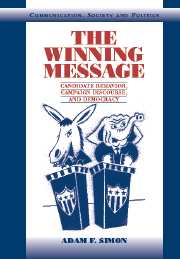Book contents
- Frontmatter
- Contents
- List of Figures
- List of Tables
- Acknowledgments
- 1 Introduction
- 2 Dialogue: A Standard for Campaign Discourse
- 3 Understanding Campaigns: Background, Theory, and Methods
- 4 The Ventriloquist's Hand: A Game-Theoretic Model of Campaigns
- 5 Duck or Punch? Dialogue in a California Gubernatorial Election
- 6 Dialogue and Its Effects in Contemporary American Elections
- 7 Explaining and Predicting the Occurrence of Dialogue
- 8 Conclusion: Toward More Substantive Campaign Discourse
- Appendix A Analysis of the Model of Campaigns in Mass Elections
- Appendix B Experimental Procedures
- References
- Index
5 - Duck or Punch? Dialogue in a California Gubernatorial Election
Published online by Cambridge University Press: 18 November 2009
- Frontmatter
- Contents
- List of Figures
- List of Tables
- Acknowledgments
- 1 Introduction
- 2 Dialogue: A Standard for Campaign Discourse
- 3 Understanding Campaigns: Background, Theory, and Methods
- 4 The Ventriloquist's Hand: A Game-Theoretic Model of Campaigns
- 5 Duck or Punch? Dialogue in a California Gubernatorial Election
- 6 Dialogue and Its Effects in Contemporary American Elections
- 7 Explaining and Predicting the Occurrence of Dialogue
- 8 Conclusion: Toward More Substantive Campaign Discourse
- Appendix A Analysis of the Model of Campaigns in Mass Elections
- Appendix B Experimental Procedures
- References
- Index
Summary
The 1994 California gubernatorial race presents an ideal situation to study the dynamics of campaign strategy with respect to the question of dialogue. It is also a classic piece of political drama. Kathleen Brown, the Democratic challenger, was by all accounts destined to win. Blessed with a national following as a rising star in the Democratic party, she attracted extraordinary early funding, had weak opposition within the party, and had established a solid reputation as state treasurer. Early polls (see Table 5.6, for details) showed Brown leading by a twenty-point margin. Pete Wilson, her Republican opponent, appeared to be a doomed incumbent, burdened by a statewide economic recession and a contentious Democrat-controlled state legislature. A year before the election, a Los Angeles Times poll placed Wilson's approval rating at a dismal 29 percent. Yet, on election day, Wilson won a decisive fourteen-point victory, recast himself as a powerful figure in the national Republican party, and left Brown's political reputation in ruins. Why? I argue that this defeat was largely the result of Brown's decision to dialogue on the subject of crime. Thus, this case study serves as an empirical demonstration of the dangers of dialogue and provides a cautionary tale to those who would expect dialogue in any strong form from contemporary campaigns.
This election exemplifies a clash between two different approaches to campaigning. It pitted Brown's more traditional campaign style against Wilson's more contemporary approach, an approach consistent with what I consider to be a modern campaign.
- Type
- Chapter
- Information
- The Winning MessageCandidate Behavior, Campaign Discourse, and Democracy, pp. 66 - 91Publisher: Cambridge University PressPrint publication year: 2002



